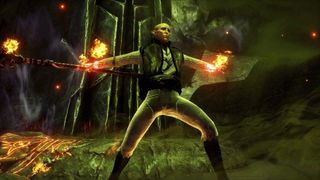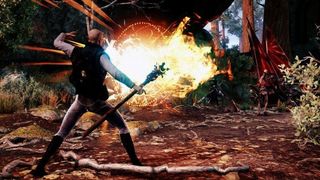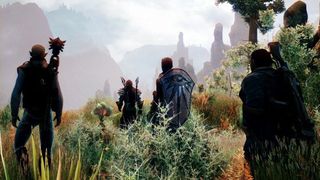Dragon Age: Inquisition interview - on fan feedback, romance, returning characters and the open world

PC Gamer: I was going to ask about the structure of the campaign. I've read as much as I could about how you have some choice about where you go and the order you complete tasks and how you go about doing things. How does that specifically differ to the traditional Bioware RPG of a couple of years ago where you have four things to do in the world, and you do four of them in whatever order you like. How is that different in this game?
Mark Darrah: In Dragon Age: Inquisition there's essentially two axes of what's happening. There's the steps you need to take to deal with the breach in the sky, to uncover who's behind it and ultimately to stop them. The steps to do that are relatively clear. You can do them in different orders, but they're relatively clear.
The second axis is that in order to do some of those things you need your inquisition to be strong enough to demand attention. If you're going to go and try to get the Templars on your side, for example, they're not listening. You need the inquisition to be strong enough to force that meeting.
That's where that broader sense, that broader exploration sense comes in because the way you empower your inquisition is through doing the things that only you can do. Through spreading your presence throughout the world, through closing fade rifts around the world, through going and dealing with the problems in the larger exploration areas and really just digging in and doing what needs to be done.
Then, when you've done that you can go and engage with the parts of the story that are going to directly attack the problems, the overarching problems. You've got two things to do. You've got your critical path and then you've got a secondary need to strengthen up your inquisition in order to proceed on the critical path.
PC Gamer: It's primarily the influence of the inquisition that divides the story up into acts or whatever.
Mark Darrah: That's right, that's a good way of looking at it.
PC Gamer Newsletter
Sign up to get the best content of the week, and great gaming deals, as picked by the editors.
PC Gamer: In terms of adding these, correct me if this is a wrong interpretation, but it seems like Inquisition is moving towards something more like an open-world game, or even strategy in some ways.
Mark Darrah: I think, definitely, we're trying for something that has a very open-world feel. The one thing that I've experienced in a lot of beautiful role games that I've played has been that when you start to disengage from those open-world systems there's nothing to come back to. Often, your last experience, just as you got bored with the game and wandered away.
In our case we want to make sure that that core, that critical path, is compelling, is strong, it's got a strong magnetism. As you disengage from the open-world you have something to reengage with. You have something drawing you through to see how it ends.

PC Gamer: There are choices in the past. You mentioned one earlier, the state of the warden, who can be dead, and obviously something that has come up with fans quite a bit, in Awakening—the zombie warden scenario. Is that something you've addressed in Inquisition?
Mark Darrah: Yes. There's a couple, the zombie warden was just a stupid decision on our part I'd say. We should have just not let you. We decided, if you want to play awakening we should let you use your warden. Well what if they're dead? We'll let you bring them back to life. We should just not have that.
PC Gamer: I made a new warden.
Mark Darrah: There's a couple of other things though. One of the big reasons for creating the [Dragon Age Keep] is the save games of the previous two games. In Origins in particular are messy and full of bugs. Zevran is a good example where you can kill him in Dragon Age: Origins and then in Dragon Age 2, those flags aren't set properly in the Origins saves, so the game doesn't realize that Zevran's dead and just basically brings him back to life.
That wasn't an intentional retcon on our part. That was actually a bug. This lets us go in and finally get those states in just something that's actually correct.
PC Gamer: In addition to fixing that stuff, do you have freedom to clarify? I suppose in some cases what fans are looking for is not necessarily for this singing or dancing cut-scene resolution to something that's been hanging, but just something to explain how this happened or how that came together?
Mark Darrah: Yes, there will be a little bit of that. Leliana is brought back to life even if she dies at the Temple of Sacred Ashes. I'm not sure that we've provided enough information as to why and what's happening, what went on there, why that's possible. Yes, this is an opportunity for us to give a little bit more context and explain what's actually going on.

PC Gamer: Fair enough. What is your criteria for determining which characters do come back? Actually, not simply from the dead, but I mean from game to game. Why would Varric make the cut and not somebody else?
Mark Darrah: That's a good question. Some of it's based on just what the writers are excited about writing. But also, we look for a certain amount of balance between the character. There's a bunch of things that we're trying to do for balance. You want a certain degree of balance between the classes. You want a certain amount of balance between the genders and then a certain amount of balance between the romance options.
If you've had a character in a previous game that was a romance option typically we won't bring them back because they carry a lot of extra baggage with them. You're not going to have a romance option come back and certainly not have them be a romance option again because there's a lot of baggage that comes with that.
The player might get angry as well. “But they're in love with my previous character forever and ever and ever. How dare you?” I think there's validity to that. You can start to cross off a few characters because of that. We often don't bring back characters, at least not as followers, if they were previously romance options. You might see them. Alistair comes back because we can do cameos and have them have an influence on the story.
But additionally, some characters, Varric's a very good character because one of Varric's primary motivations is he's the guy that's got your back. He's your friend. He's a very good character to have because it's good to have someone in your camp no matter what. That makes him a very attractive character. It makes him an interesting character to have because he offers a nice counterpoint to a lot of other kinds of characters.
The other thing that causes us to bring someone back is someone that we're just simply not done with. That the arc is incomplete. Isabella between Origins and Dragon Age 2 is a good example of that. We introduced her, but there's just a lot more to be done with that. That's actually usually how we choose. Often characters move. We don't reuse followers very often. Obviously, we are reusing Varric. We typically promote secondary characters between games.
PC Gamer: Right, so someone graduates from being a quest-giving NPC to being a companion.
Mark Darrah: Yes.
PC Gamer: I read, recently, I think it was something that came out of PAX about diversifying the types of romantic relationship in the game. I was going to ask if some of that thinking also applies to friendship as well because obviously it's a type of relationship that people have with the companions that's not necessarily binary.
Mark Darrah: Friendship I think is … I think we've become trapped by that, the word romance. I think friendship is … I actually regret that in Dragon Age 2 we didn't have essentially that kind of bromance with Varric. He's not a romance, but he's, you can hang out with him and be your bud and have that same kind of depth. Some of our, what we would traditionally call romances in Dragon Age: Inquisition are falling more into that camp where they're not … they're more in that friendship area.
PC Gamer: Thank you very much for your time.
Joining in 2011, Chris made his start with PC Gamer turning beautiful trees into magazines, first as a writer and later as deputy editor. Once PCG's reluctant MMO champion , his discovery of Dota 2 in 2012 led him to much darker, stranger places. In 2015, Chris became the editor of PC Gamer Pro, overseeing our online coverage of competitive gaming and esports. He left in 2017, and can be now found making games and recording the Crate & Crowbar podcast.
Most Popular





